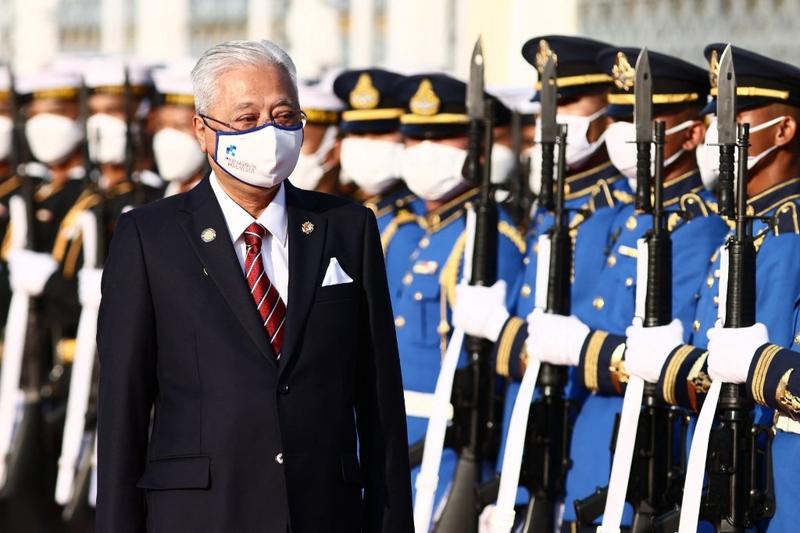 Malaysia's Prime Minister Ismail Sabri Yaakob inspects the guard of honor during a welcoming ceremony at the Government House in Bangkok on Feb 25, 2022. (JACK TAYLOR / AFP)
Malaysia's Prime Minister Ismail Sabri Yaakob inspects the guard of honor during a welcoming ceremony at the Government House in Bangkok on Feb 25, 2022. (JACK TAYLOR / AFP)
Malaysia’s decision to oppose unilateral sanctions against Russia reflects the principle of non-interference upheld by the Association of Southeast Asian Nations in general, analysts say.
Malaysia is one of the founding members of ASEAN, which has not issued an official position on the sanctions, but individual members have made their positions clear on the issue.
Malaysian Prime Minister Ismail Sabri Yaakob said on March 22 during an official visit to Vietnam that both nations “do not support unilateral sanctions
Malaysian Prime Minister Ismail Sabri Yaakob said on March 22 during an official visit to Vietnam that both nations “do not support unilateral sanctions. We recognize restrictions that could be imposed only by the UN Security Council”.
"We discussed the Russian-Ukrainian conflict and agreed that Malaysia and Vietnam will remain neutral on this issue. As for sanctions against Russia, we do not support them,” Ismail Sabri said at a press briefing.
ALSO READ: Russia-Ukraine conflict 'adds uncertainty to Asian economy'
Earlier this month, Malaysian Foreign Minister Saifuddin Abdullah said that his nation has no plans to impose sanctions against Russia, noting that “innocent people will be the ones who suffer” from sanctions. Saifuddin also told the members of the Malaysian parliament that the country, as a member of the UN Human Rights Council, has asked for a ceasefire between Russia and Ukraine and for the continuation of peace negotiations.
Azmil Tayeb, senior lecturer at the School of Social Sciences at Universiti Sains Malaysia, said Malaysia’s decision to remain neutral is “based on the ASEAN's non-interference principle though that’s not the official position of ASEAN as an organization”.
“Malaysia always tried to be neutral when it comes to conflict in other countries. It is also consistent with the long-standing ASEAN policy of non-interference in domestic affairs,” said James Chin, professor of Asian Studies at the University of Tasmania in Australia.
Malaysia has voted in favor of the UN General Assembly’s resolution that demanded Russia to “immediately, completely and unconditionally withdraw all of its military forces from the territory of Ukraine within its internationally recognized borders”. But Chin said that Malaysia’s support for the UN resolution is a “separate issue” from the imposition of unilateral sanctions against Russia.
ALSO READ: India's stance independent on NATO-Russia row
Malaysia’s Ministry of Foreign Affairs said in a statement issued after the 11th Emergency Special Session of the UNGA that while Malaysia may not have agreed to every single word in the resolution, the country supported the resolution as it was in line with its position of upholding the “principles of sovereignty, independence and territorial integrity of States — principles which are sacrosanct to Malaysia”.
Apart from Malaysia and Vietnam, Indonesia has also stated that it is not supporting unilateral sanctions against Russia. Singapore is the only Southeast Asian country so far that has sanctioned Russia. The Singaporean government prohibited all financial institutions in the city-state from dealing with Russian banks.
Neither Russia nor Ukraine is a major trade partner of Malaysia. But Moscow has exported weapons and defense armaments to Malaysia and this might have affected Malaysia’s position on sanctions, according to Oh Ei Sun, senior fellow at the Singapore Institute of International Affairs.
“Malaysia purchased a lot of heavy weaponry from Russia, especially fighter jets. So if Malaysia sanctions Russia then the maintenance of these jets and the training of the pilots and other personnel would be in jeopardy,” he said.
READ MORE: Russia imposes sanctions on Biden, other top US officials
In 2003, Malaysia and Russia signed a $900 million contract for 18 Su-30MKM jets. The military aircraft were delivered in 2007. Russia has also agreed to train and send a Malaysian astronaut to the International Space Station.
Oh said that another consideration is that Russia is a major exporter of fertilizer — a key input in oil palm farming, which is one of Malaysia’s biggest industries.
“Malaysia can’t just cut off financial ties (with Russia) … it can’t afford to (impose) sanctions,” he said.


